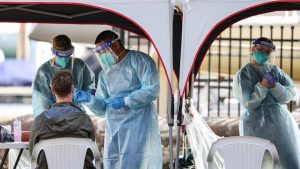On December 1, 2020 BC Care Providers Association (BCCPA) will be hosting its Annual General Meeting (AGM), which due to COVID-19 will be taking place virtually via Zoom. Along with updating members on last year’s key accomplishments and future plans for the organization, the AGM will provide an opportunity for members to vote on different procedural matters as well as several policy motions. With regards to the policy motions, BCCPA is pleased to present several important issues for debate:
- A provincial tax credit program for home health care and independent living (IL) services;
- Civil Liability Protection for BC’s Seniors’ Care and Living Sector; and
- A COVID-19 Testing Strategy for BC’s Seniors’ Care Sector.
Provincial tax credit program for home health care and independent living services
Despite the reality that many older adults will require assisted living or long-term care supports, 91% of Canadians of all ages – and almost 100% of Canadians 65 years of age and older – report that they plan on supporting themselves to live safely and independently in their own home as long as possible.
 In this regard, non-government home care and home support services are a critical, but often underrecognized component of B.C.’s senior care system; while independent living (sometimes referred to as seniors’ living or retirement living) has become a preferred choice for many seniors who are able to continue living independently in the more than 19,000 suites across the province, but can benefit with the assistance of support services such as meals, housekeeping and recreation.
In this regard, non-government home care and home support services are a critical, but often underrecognized component of B.C.’s senior care system; while independent living (sometimes referred to as seniors’ living or retirement living) has become a preferred choice for many seniors who are able to continue living independently in the more than 19,000 suites across the province, but can benefit with the assistance of support services such as meals, housekeeping and recreation.
Over the coming years, it is expected COVID-19 will affect the affordability and sustainability of private home health services and independent living; and as such BCCPA believes that a new stand alone, provincial tax credit could help to subsidize the costs incurred by seniors who access services privately. Along with supporting seniors to age in place and remain independent, a refundable tax credit should also help ensure that the public system can remain sustainable as BC prepares for an aging population.
Civil Liability Protection for BC’s Seniors’ Care and Living Sector
The issue of civil liability is another motion that will be debated at the AGM as various care home operators are facing multiple class action lawsuits, and the unprecedented nature of the pandemic has placed undue financial and other strains on care providers, while they work to maintain high quality levels of care and safety for residents in the community.[ii]
In response, governments such as Ontario have introduced legislation (i.e. Bill 218, Supporting Ontario’s Recovery Act) which shields workers as well as operators in the seniors’ care and living sector (including long term care and retirement homes) who act in “good faith” and without “gross negligence,” from being sued for exposing others to the novel coronavirus that causes COVID-19.[iii] With Bill 218, Ontario becomes the third jurisdiction in Canada and the 38th jurisdiction in North America to propose protections from civil liability relating to exposure to COVID-19 and, if enacted, would offer protection from civil liability for workers, volunteers and essential businesses that have made and are making an honest effort to follow public health guidelines and COVID-19-related laws.[iv]
One of the main arguments in favor of immunity is that COVID-19 lawsuits will exacerbate pressures from providers already reeling from rising insurance costs due to an elevated risk environment[v] as seen in Ontario where many care homes are unable to obtain insurance and might be forced to close.[vi]
While BC passed a cabinet order[vii] that provides a strong temporary liability shield[viii] stating any person or corporation “providing an essential service” is not liable for damages resulting from COVID-19 infections, and the list of BC essential service providers granted immunity includes front-line health workers and long-term care homes; it does not apply in all circumstances.[ix] Likewise, it only provides limited protections – such as a liability extension of 45 days after emergency orders are lifted – while other sectors such as sports and bylaw enforcement get an extended 90-day extension of liability protection.[x]
As such as part of this motion the BCCPA is recommending that government introduce appropriate legislation that would offer protection from civil liability for workers, volunteers and organizations in the seniors’ care and living sector – including long term care, assisted living, independent living and home health care operators – that have made and are making an honest effort to follow public health guidelines and COVID-19-related laws.
COVID-19 Testing Strategy for BC’s Seniors’ Care Sector
As outlined in the final motion a comprehensive testing and contact tracing strategy is one of the key pillars of any provincial approach to reducing and mitigating the spread of COVID-19 in the seniors’ care and living sector;[xi] particularly those who might be at an elevated risk of mortality and morbidity if exposed to SARS-CoV-2.
Emerging evidence demonstrates that COVID-19 outbreaks in seniors’ care and living residences is highly correlated with community transmission,[xii],[xiii] and the number of outbreaks in British Columbia’s seniors’ care and living settings has increased significantly since the summer of 2020. In addition, up to three-quarters of positive COVID-19 cases among staff in continuing care may be asymptomatic or pre-symptomatic, and not detected by symptom screening or one-off testing.[xiv],[xv],[xvi]
As such, timely test results (ideally within 24 hours) are crucial to preventing and managing outbreaks in seniors’ care and living settings where the elderly are most vulnerable to the virus.[xvii],[xviii],[xix] An October 2020 interim report from Ontario’s Long Term Care Commission, for example, recommends long-term care residents should be provided the highest priority access to testing and quick turn-around of results for residents and staff including that government prioritize long term care for point of care and less invasive tests as they become available.[xx]
While the Government of British Columbia has announced $1.6 billion for a fall and winter preparedness plan, including hiring an additional 600 contact tracers with the goal to increase capacity to 20,000 tests per day;[xxi] and the Government of Canada has approved the provincial use of rapid-testing and purchased 7.9 million rapid tests for distribution to the provinces and territories;[xxii] the BCCPA believes there is an immediate need for developing a testing strategy for older adults that is fully funded by the BC government as well as outlines guidelines in areas such as how often workers are tested and targets for test turnaround times (i.e. ideally within 24 hours).
The BCCPA also believes, increased and expedited testing also has the potential to reduce COVID-19 outbreaks in the seniors’ care and living sector, as well as facilitate the safe return of social visitors, as identified in BCCPA’s The Best Visit Possible guide for supporting family visits during COVID-19;[xxiii].
As such in its final motion to be debated at its AGM, BCCPA recommends that by the end of December 2020, the BC Government develop and fully fund a provincial COVID-19 testing strategy for seniors’ care and living that includes specific targets around the frequency of testing and test result turnaround times for those working in long term care, assisted living, home health and independent living in order to help prevent or mitigate the spread of COVID-19. Along with providing priority access to testing and quick turn-around of results, the BC Government should also prioritize the seniors care sector for point of care and less invasive tests as they become available.
ENDNOTES
[i] National Institute on Ageing. October 2020. Pandemic Perspectives on Ageing in Canada in Light of COVID-19: Findings from a National Institute on Ageing/TELUS Health National Survey. Accessed at: https://static1.squarespace.com/static/5c2fa7b03917eed9b5a436d8/t/5f85fe24729f041f154f5668/1602616868871/PandemicPerspectives+oct13.pdf.
[ii] Senior Housing News. Fight Intensifies Over Covid-19 Legal Immunity for Senior Living. June 7, 2020. Accessed at: https://seniorhousingnews.com/2020/06/07/fight-intensifies-over-covid-19-legal-immunity-for-senior-living/
[iii] Huffington Post. Doug Ford Defends Law That Makes It Harder to Sue for COVID-19 Exposure. October 21, 2020. Accessed at: https://www.huffingtonpost.ca/entry/doug-ford-covid-liability-protection_ca_5f9094b3c5b686eaaa0dc8b4
[iv] Goodmans LLP. Ontario proposes protections from civil liability relating to COVID-19 exposure. October 22, 2020. Accessed at: https://www.goodmans.ca/files/file/docs/10.22.2020%20-%20Health%20Care%20Law.pdf
[v] Senior Housing News. Fight Intensifies Over Covid-19 Legal Immunity for Senior Living. June 7, 2020. Accessed at: https://seniorhousingnews.com/2020/06/07/fight-intensifies-over-covid-19-legal-immunity-for-senior-living/
[vi] CJOY 1460. Some Ontario long-term care homes can not get insurance, could be forced to close: association. October 20, 2020. Accessed at: https://cjoy.com/news/7407929/ontario-long-term-care-homes-liability-insurance/
[vii] Ministerial Order MO94 (Protection Against Liability – COVID-19 – Order) under the Emergency Program Act on April 2, 2020. Accessed at: https://www.bclaws.ca/civix/document/id/mo/mo/m0094_2020.
[viii] Under Section 3(1) of Ministerial Order MO94 it notes: a person is not liable for damages resulting, directly or indirectly, from an individual being or likely being infected with or exposed to SARS-CoV-2 as a result of the person’s operating or providing an essential service if, at the relevant time, the person (a) was operating or providing the essential service in accordance with all applicable emergency and public health guidance, or (b) reasonably believed that the person was operating or providing the essential service in accordance with all applicable emergency and public health guidance.
[ix] CBC News. Ontario to provide COVID-19 liability protection to businesses, workers and some organizations. October 20, 2020. Accessed at: https://www.cbc.ca/news/canada/toronto/covid-19-liability-protection-legislation-ontario-1.5769801
[x] Harris Workplace and Advocacy. COVID-19 Measures Act: Preparing for the end of the COVID-19 State of Emergency. June 23, 2020. Accessed at: https://harrisco.com/covid-19-measures-act-preparing-for-the-end-of-the-covid-19-state-of-emergency/
[xi] The Coronavirus and the Risks to the Elderly in Long-Term Care. Journal of Aging and Social Policy. William Gardner and Nicholas Bagley. March 2020. Accessed at: https://www.tandfonline.com/doi/full/10.1080/08959420.2020.1750543
[xii] American Health Care Association and National Centre for Assisted Living. REPORT: COVID-19 Cases in U.S. Nursing Homes. Updated October 19, 2020. Accessed at: https://www.ahcancal.org/News-and-Communications/Fact-Sheets/FactSheets/Report-Nursing-Homes-Cases-Oct19-2020.pdf
[xiii] McKnight’s Long-Term Care News. COVID outbreaks tied to where nursing home staff live, researchers say. September 2020. Accessed at: https://www.mcknights.com/news/clinical-news/covid-outbreaks-tied-to-where-nursing-home-staff-lives-researchers-say/
[xiv] Salcher-Konrad M and Comas-Herrera A (2020) International evidence on care home COVID-19 outbreak responses, summary of key findings. LTCcovid, International Long-Term Care Policy Network, 12 June 2020.
[xv] Comas-Herrera A, Ashcroft E and Lorenz-Dant K. (2020) International examples of measures to prevent and manage COVID-19 outbreaks in residential care and nursing home settings. Report in LTCcovid.org, International Long-Term Care Policy Network, CPEC-LSE, 11 May 2020.
[xvi] World Health Organization. Preventing and managing COVID-19 across long-term care services: Policy brief, 24 July 2020. Accessed at: https://www.who.int/publications/i/item/WHO-2019-nCoV-Policy_Brief-Long-term_Care-2020.1.
[xvii] Globe and Mail. Delays in COVID-19 testing results putting long-term care homes at greater risk. October 20, 2020. Accessed at: https://www.theglobeandmail.com/canada/article-delays-in-covid-19-testing-results-putting-long-term-care-homes-at/
[xviii] Globe and Mail. Delays in COVID-19 testing results putting long-term care homes at greater risk. October 20, 2020. Accessed at: https://www.theglobeandmail.com/canada/article-delays-in-covid-19-testing-results-putting-long-term-care-homes-at/
[xix] Ontario’s Long-Term Care COVID-19 Commission. Interim Recommendations. October 23, 2020. Accessed at: http://www.ltccommission-commissionsld.ca/ir/pdf/20201023_First%20Interim%20Letter_English.pdf
[xx] Ontario’s Long-Term Care COVID-19 Commission. Interim Recommendations. October 23, 2020. Accessed at: http://www.ltccommission-commissionsld.ca/ir/pdf/20201023_First%20Interim%20Letter_English.pdf
[xxi] BC Office of the Premier. Investment brings new support to those most vulnerable to COVID-19 and communities where they live. September 9, 2020. Accessed at: https://news.gov.bc.ca/releases/2020PREM0050-001694
[xxii] Global News. Health Canada approves rapid coronavirus test after feds put 7.9M on order. September 30, 2020. Accessed at: https://globalnews.ca/news/7369046/health-canada-approves-rapid-coronavirus-test/
[xxiii] BCCPA. The Best Visit Possible: A guide for supporting family visits during COVID-19. September 2020. Accessed at: https://bccare.ca/wp-content/uploads/2020/09/The-Best-Visit-Possible-Sept-21.pdf





